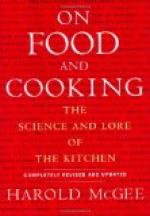The chemical process of bread-raising originally consisted in adding to the dough definite proportions of muriatic acid and carbonate of soda, by the union of which carbonic acid gas and common salt were produced. This process was soon abandoned, however, on account of the propensity exhibited by the acid for eating holes in the fingers of the baker as well as in his bread pans; and a more convenient one for hands and pans, that of using soda or salaratus with cream of tartar or sour milk, was substituted. When there is an excess of soda, a portion of it remains in the loaf uncombined, giving to the bread a yellow color and an alkaline taste, and doing mischief to the delicate coating of the stomach. Alkalies, the class of chemicals to which soda and salaratus belong, when pure and strong, are powerful corrosive poisons. The acid used with the alkali to liberate the carbonic-acid gas in the process of bread-making, if rightly proportioned, destroys this poisonous property, and unites with it to form a new compound, which, although not a poison, is yet unwholesome.
We can hardly speak too strongly in condemnation of the use of chemicals in bread-making, when we reflect that the majority of housewives who combine sour milk and salaratus, or cream of tartar and soda, more frequently than otherwise guess at the proportions, or measure them by some “rule of thumb,” without stopping to consider that although two cups of sour milk may at one time be sufficiently acid to neutralize a teaspoonful of saleratus, milk may vary in degree of acidity to such an extent that the same quantity will be quite insufficient for the purpose at another time; or that though a teaspoonful of some brand of cream of tartar will neutralize a half teaspoonful of one kind of soda, similar measures will not always bring about the same result. Very seldom, indeed, will the proportions be sufficiently exact to perfectly neutralise the alkali, since chemicals are subject to variations in degree of strength, both on account of the method by which they are manufactured and the length of time they have been kept, to say nothing of adulterations to which they may have been subjected, and which are so common that it is almost impossible to find unadulterated cream of tartar in the market.
Baking powders are essentially composed of bicarbonate of soda and cream of tartar, mixed in the proper proportions to exactly neutralize each other, and if they were always pure, would certainly be as good as soda and cream of tartar in any form, and possess the added advantage of perfect proportions; but as was demonstrated not long ago by the government chemist, nearly every variety of baking powder in the market is largely adulterated with cheaper and harmful substances. Alum, a most frequent constituent of such baking powders, is exceedingly injurious to the stomach. Out of several hundred brands of baking powder examined, only one was found pure.




